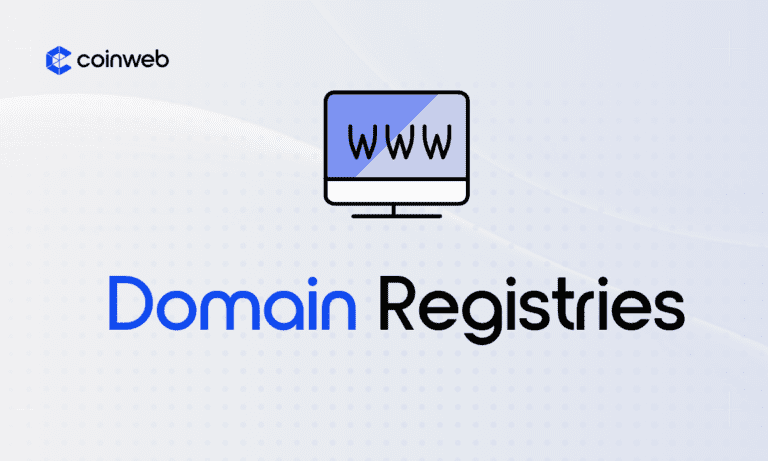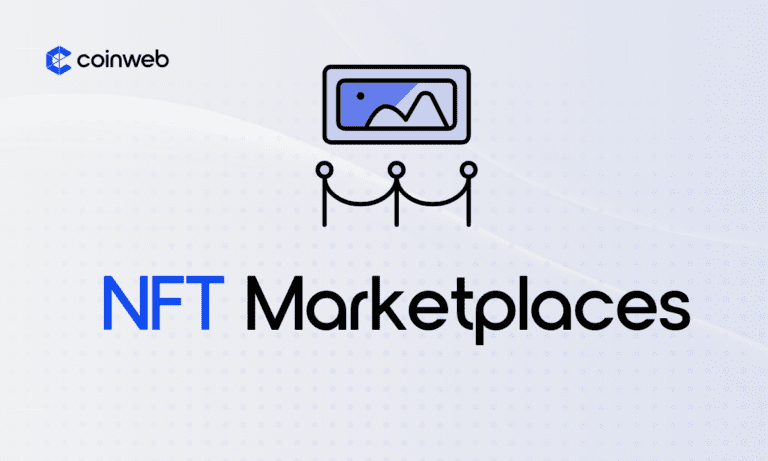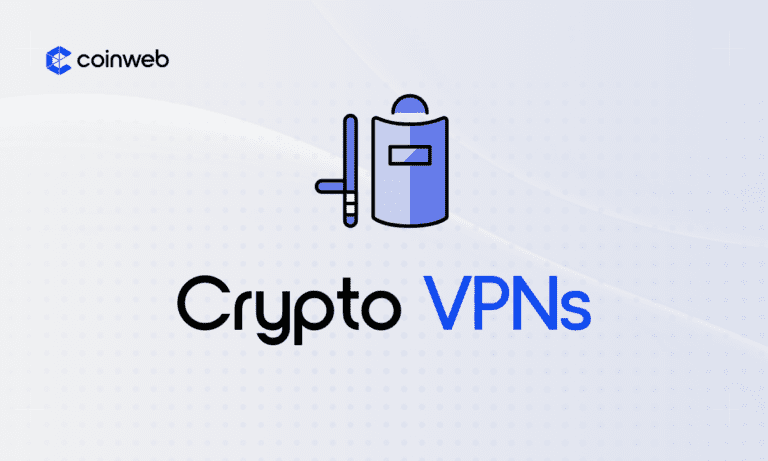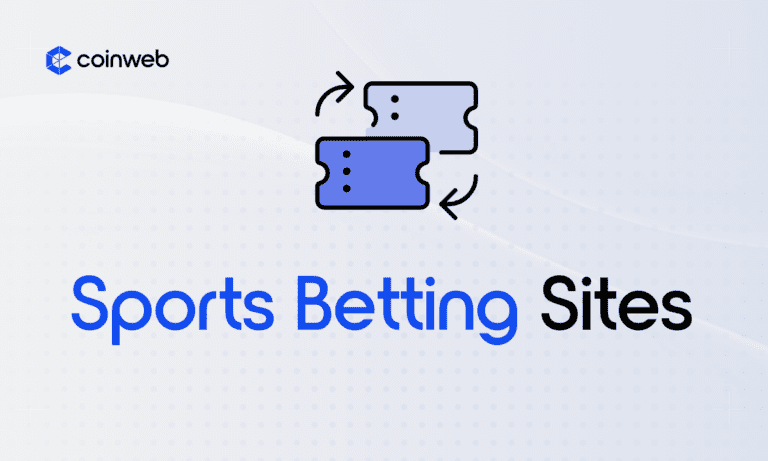TLDR
Blockchain domain registry sites are revolutionizing how we register, manage, and resolve domain names on the blockchain. In this comparison, we have listed the best blockchain domain registries in the industry so you can safely start your Web 3 domain journey.
We have researched and explored different features, types, and functions so that you can choose the right one. Decentralized domain naming systems operate on a peer-to-peer server network, setting them apart from traditional DNS.
Powered by smart contracts, these sites ensure the domain owner has complete control over their domain, preventing censorship or unauthorized alterations. Blockchain domains, called domain NFTs, serve as readable web addresses and cryptocurrency wallets. Some registry sites even offer the convenience of making online crypto payments, acting as an extra wallet option for users.
What are blockchain domains?
Unlike traditional domains, Blockchain domains are registered and stored within a decentralized blockchain network.
This innovative technology, which is frequently linked to DeFi space, offers a multitude of highly coveted attributes, including transparency, security, and, above all, no centralized control. That means full ownership and responsibility.
Besides, there are no recurring fees to keep your domain; a small one-time payment is all you need to own it indefinitely.
Like regular domains, blockchain domains consist of easily understandable text strings separated by a period, followed by the domain ending or top-level domain (TLD). You are probably used to domains like .com, .org, .info, and .xyz. We are now using these TLDs in blockchain domains:
- .888
- .bitcoin
- .blockchain
- .coin
- .crypto
- .dao
- .nft
- .wallet
- .x
- .zil
Cool, right? The best part is that as blockchain domains gain traction and popularity, additional TLDs may be introduced to cater to the evolving demands of users.

How does the blockchain domain work?
Unlike traditional domains that are stored on servers, blockchain domains reside in public registries on publicly accessible blockchains. This unique setup offers remarkable transparency, allowing anyone to view the records.
Additionally, users enjoy heightened security as they can update their domain names. This mitigates concerns regarding server breaches or domain theft. No worry about security anymore.
Furthermore, if you are familiar with the crypto space, you must know about the critical role of a compatible wallet in keeping your assets secure. NFT domains serve more than just a website address. They can function as cryptocurrency wallets, too, by being connected to your Web 3 wallets. Being NFTs, you can buy, sell, and hold them like regular NFTs.
Regarding websites, you can enter your website URL and NFT domain name in a compatible browser. Like Web 2.0 domains like .com and .org, the NFT domain will display the website content you’ve placed there. As a cryptocurrency wallet, you can also use the same domain name to send and receive compatible cryptocurrencies.

Difference between traditional DNS and Blockchain domain registries
There are distinctions between traditional DNS and blockchain domain registries. Let us look at the main ones as outlined below.
Ownership
Third-party registrars like GoDaddy and Namecheap can grant or revoke domain ownership in case of contract breaches or non-renewal by the domain owner. Therefore, domain owners need to possess full ownership of their purchased domains.
Conversely, when you acquire a blockchain domain, you gain permanent ownership without the burden of renewal fees. No one else besides you controls your domain.
Administration
ICANN governs traditional domain names, enforcing regulations and guidelines. In contrast, blockchain domains reside on decentralized networks, granting owners complete control.
This autonomy empowers owners to host content that might face censorship on regular domains. Transferring blockchain domains to other individuals can also be achieved without involving registrars or registries.
Storage
Blockchain domains find their home within blockchain networks. For example, once acquired, blockchain domains with a .eth extension reside on the Ethereum blockchain. On the other hand, traditional domains are stored in Domain Name System (DNS) servers.

Types of Blockchain Name services
Blockchain-based domain names are different on every blockchain, offering different features. Here are some different types and what they offer:
Public blockchain name service
Public blockchain naming services allow everyone to access and participate in the naming process. These services utilize crypto economics, combining economic incentives with cryptographic verification methods like proof-of-work or proof-of-stake to ensure the security and decentralization of the naming system.
One of the key advantages of public blockchain naming services is that they provide a level of protection for users by limiting developers’ control over specific actions.
By leveraging open networks, these services eliminate the need for third-party verification, making them attractive to organizations seeking decentralized software solutions.
Another benefit is the anonymity offered by public blockchain naming services. Users can safely use the system without revealing their true digital identity. This privacy feature ensures that transactions and activities on the network are untraceable if user identities are protected.
However, it’s essential to consider the computational requirements, transaction privacy limitations, and potential security issues associated with public blockchain naming services when considering their application in various industries.
Pros
- No central authority, promoting inclusivity and democracy.
- Publicly accessible information fosters trust among users.
- Tamper-proof domain names provide enhanced security.
Cons
- Potential limitations in handling a large volume of transactions.
- Insufficient standardized regulations and governance frameworks.
- Potential challenges for non-technical users in navigating the system.

Private blockchain name service
Private Domain Naming Service (DNS) is a controlled and permissioned system managed by a single entity. Like private blockchains, the central authority in Private DNS determines which nodes are allowed.
However, not all nodes have equal rights to execute functions. Although private DNS is partially decentralized due to restricted public access, it provides enhanced data confidentiality for corporate-level network sharing.
Private blockchains offer stability by limiting access to specific transactions, making them a reliable network choice.
Furthermore, compliance is crucial in every industry, and private blockchains ensure seamless transactions by adhering to and integrating all necessary compliance regulations.
Pros
- Private DNS ensures higher privacy and data confidentiality for sensitive networks.
- It offers a more stable network environment with limited access to specific transactions.
- Integrate compliance regulations, ensuring seamless and compliant transactions.
Cons
- Private DNS is administered by a single entity, resulting in a partially decentralized system.
- It may be more susceptible to targeted attacks or security breaches.
- It requires additional resources and expertise, increasing costs and administrative complexities.

Consortium blockchain
Consortium blockchain naming services operate differently from public and private blockchains, which can initially confuse. They are considered semi-decentralized, involving a group of approved individuals rather than a single entity like private blockchains.
These blockchains consist of pre-defined network nodes, combining the security features of public blockchains with enhanced control. Consortium blockchains are commonly used in enterprise settings, where multiple organizations collaborate to leverage blockchain technology for business improvement.
However, consortium blockchains may also allow for a hybrid access approach, where participants have restricted access.
Pros
- It offers heightened security through a group of approved participants governing the blockchain.
- It facilitates efficient coordination, consensus-building, and shared decision-making.
Cons
- It can expose them to risks from malicious actors or dominant consortium members.
- Establishing and managing a consortium blockchain naming service involves navigating logistical complexities.

Hybrid blockchain
A hybrid blockchain domain registry combines features from public and private blockchains. It ensures transparency through a consensus mechanism on the public blockchain while storing data securely on the private blockchain. Interestingly, it is accessible only to authorized individuals.
This innovative blend of openness and privacy offers potential applications in finance, governance, and supply chain management industries. In a hybrid blockchain technology, transactions and data on the decentralized ledger are immutable, providing integrity.
On top of that, new users’ identities are kept confidential until they initiate transactions with other participants.
Pros
- Allows for anonymity, enabling smooth communication without leaking information to the public.
- It is faster, more scalable than public blockchains, and easier to control than private ones.
- Hybrid blockchains offer decentralized ledger flexibility.
Cons
- Complex maintenance of real-time ledger for users’ chosen features.
- Potential scalability limitations due to the combination of public and private aspects.
- Dependency on a centralized authority for governance and decision-making.

Choosing blockchain name services
Selecting a domain registrar carefully is important. With multiple domain registration platforms available, choosing the right one can be challenging. Below are some essential factors to consider:
Affordability and pricing
Pricing is essential when picking a domain registrar for your business or crypto wallet. We recommend taking the time to review the pricing models offered by different registrars.
The cost of domain names alters based on the extension, for example, .com, .org, .net, or .io. It’s not necessary to opt for the most expensive registrar. Instead, compare prices among top registrars and find one that offers a reasonable price for your desired domain names.
Selecting a reliable platform that ensures reasonable prices and has a proven history of delivering exceptional customer service is better.
Don’t pay extra fees or go through the hassle if you are unsatisfied with your registrar. Although it may seem daunting, switching registrars can be a worthwhile decision if you are unhappy with the services or pricing of your current provider.
While most registrars do not impose additional transfer charges, we recommend reviewing their transfer policies beforehand.
Certain registrars may intentionally create hurdles, making the transfer process difficult or even impossible. To avoid such complications, carefully examine the domain transfer process before committing to a registrar.
Domain renewal prices
When acquiring a domain, it’s important to note that it has a limited validity period, requiring renewal. Since you won’t abandon the website domain after the initial registration period, it’s crucial to consider the renewal charges when selecting a domain registrar.
Typically, renewal costs are higher than the initial registration fees. Take the time to review the terms and pricing of different registrar companies to find the most affordable renewal prices. Additionally, prioritize domain providers that offer an easy renewal process without confusing terms.
Transparency
Transparency is vital when choosing a domain registrar for your website. A reputable company has nothing to hide from its customers. Look for registrars that provide upfront pricing information and detailed terms and conditions to avoid surprises later.
Ensure that essential details such as renewal processes, charges, domain transfer methods, and domain registration cancellation policies are easily accessible on their websites. If you can find such information without hassle, it’s a good indication of a reliable registrar.
Consider scanning the registrar’s social media handles for any negative feedback from existing customers. If you encounter such comments, conduct further research to avoid similar experiences.

Domain expiration policy
Someone else can purchase a domain if it expires, potentially locking you out of your business website. In such cases, you may be forced to repurchase the domain at a higher cost or risk losing access permanently. Before acquiring a domain, thoroughly review the registrar’s domain expiration policy.
While most companies have automatic domain renewal, it’s essential to confirm this before making the purchase.
Reputable web3 domain registration companies often provide a grace period after domain expiration, during which the purchased domain remains locked to your account, allowing you to renew it.
Robust customer support
After registering your domain name, you may encounter issues that require assistance. In such situations, it’s crucial to have a registrar who provides prompt and reliable support without pushing unnecessary add-on features.
Conduct thorough research on the registrar companies you are considering and examine user reviews related to customer support.
Additionally, you may want to consider contacting their support team before deciding to gauge their responsiveness and professionalism in addressing your technical or general queries. A registrar that offers excellent customer support ensures you receive the assistance you need when it matters most.

User experience and interface
User experience is an essential factor to consider when choosing a registrar company. The platform’s website should be easy to navigate, intuitive, and provide access to essential information in case of any issues.
Having a registrar with a comprehensive knowledge base can be highly beneficial when immediate support is unavailable. Timely renewal of your domain name is crucial to maintain ownership.
An ideal registrar will send you automated reminders before your domain expires, ensuring you don’t overlook renewal. This feature proves particularly helpful if you haven’t activated auto-renewal or need to update your credit card information. By prioritizing user experience and offering convenient renewal reminders, a registrar can enhance your overall domain management experience.

Security and privacy
It is crucial to prioritize data privacy when collaborating with a registrar. Ensure that the registrar takes measures to protect your data from public exposure.
Beware of companies with a track record of selling customer data to third parties, mining the WHOIS database, or sending false renewal invoices.
Choose a reliable registrar that upholds data privacy and avoids engaging in unfair practices. Neglecting this due diligence can lead to complications for your website.
In addition to protecting your information, focus on the security of your domain name. Over the last few years, domain hijacking has become increasingly common, where control is seized to sell it to competitors or the original owner.
Select a trusted domain registrar that implements robust measures to prevent domain hijacking. Verify the registrar’s authentication and security protocols to ensure protection against this threat.

What’s the future of Blockchain domain names?
Web 3.0 remains on the outskirts for most Internet users, while Web 2.0 flourishes with its profitable online industry. However, blockchain tech is improving to make the internet more secure and functional.
Web 3.0 has limitations like accessibility, cost, scalability, and user experience. The complexity and additional requirements for accessing NFT domains deter casual Internet users.
Nevertheless, developers are actively working towards making decentralization more mainstream and user-friendly, which may change the landscape.
As innovations like artificial intelligence (AI) advance integral components of Web 3.0 and the digital world’s smart applications, we anticipate a more widely accessible version of Web 3.0, cryptocurrencies, and NFTs. The vision of a digital world with a decentralized Internet is within our grasp.

Conclusion
Blockchain DNS revolutionizes domain name registration, management, and resolution through blockchain-based domain name systems like .bit, .bazar, and .coin. The encrypted nature of DNS files provides robust protection against hacking, modification, deletion, and corruption.
Moreover, these files are immune to censorship imposed by governments. The lookup tables are distributed across a peer-to-peer network on the blockchain, enhancing resilience.
By combining Bitcoin blockchain DNS with technologies such as Interplanetary File Systems (IPFS), websites become more secure, private, resistant to hacking and censorship, reliable, and readily available. Only domain owners have the authority to modify existing records and transfer domains, ensuring complete control and ownership.
Blockchain domains are unique and often end with extensions like .crypto, .eth, and .zil. These specialized domain extensions are designed to work seamlessly with blockchain technologies and decentralized networks, enabling enhanced functionality and integration with blockchain-based applications.
Blockchain domains can be registered through specific blockchain domain registrars or platforms that support blockchain domain registration. Some popular platforms include Unstoppable Domains, Ethereum name service (ENS) domains, and NEAR domains.
Domain names are registered by choosing a registrar or platform, searching for the desired domain name's availability, providing the necessary information, and completing the registration process on the preferred blockchain.
An example of a decentralized domain naming service and name registrar is Unstoppable Domains, which offers blockchain-based domain names with decentralized ownership and censorship resistance.















